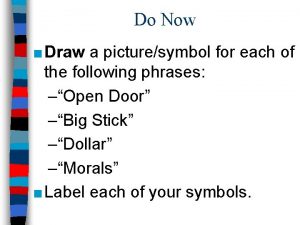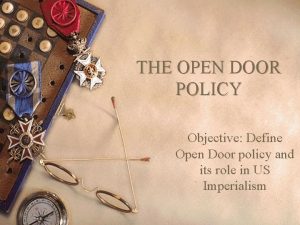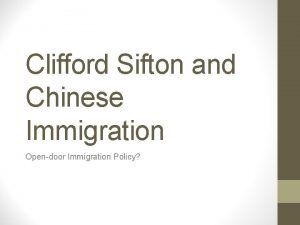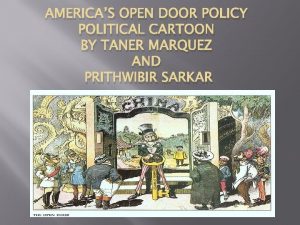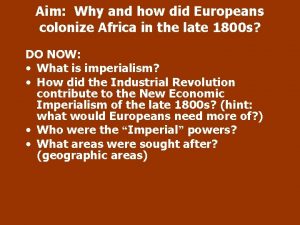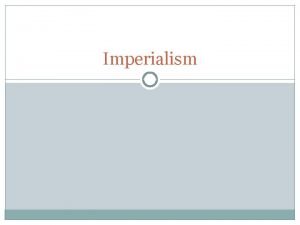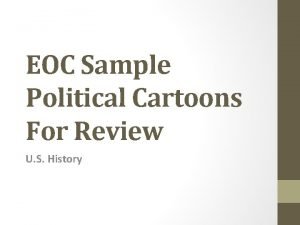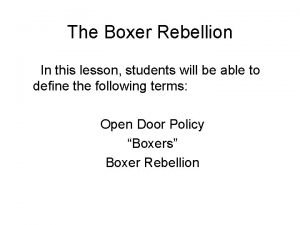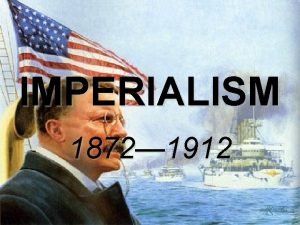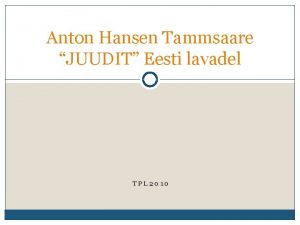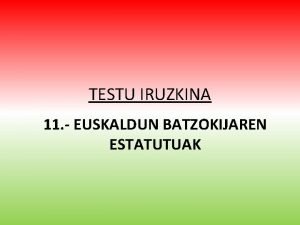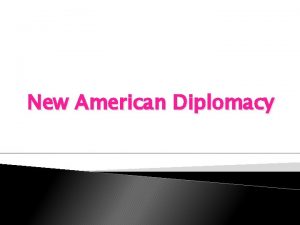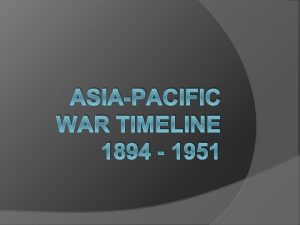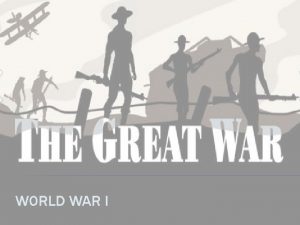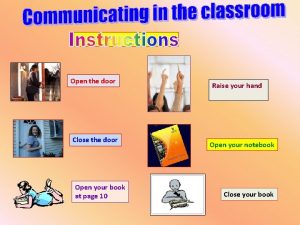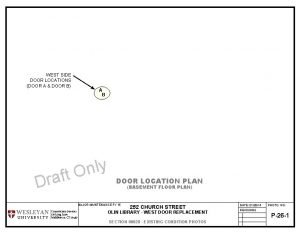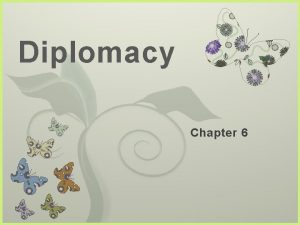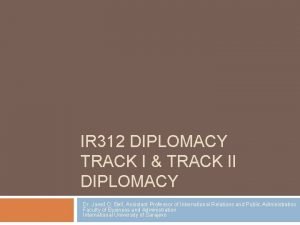New American Diplomacy Open Door Policy 1894 War
















- Slides: 16

New American Diplomacy

Open Door Policy � 1894 War erupts between China and Japan over Korea ◦ Japan easily defeats China and grants Korea their independence and gained territory in Manchuria � Russia did not like this, so together with Germany and France forced Japan out and made China lease the territory to Russia ◦ Became a “sphere of influence” an area in which a foreign nation controlled economic developments

Open Door Policy � President Mc. Kinley and Secretary of State John Hay supported an “open door policy” ◦ All countries would be allowed to trade with China � Hay sent notes to all of the countries with leaseholds in China to persuade them to agree to the Open Door Policy ◦ They agreed as long as ALL of the countries agreed to it as well

Boxer Rebellion � Secret Chinese societies organized with the increasing influence of foreign nations � The Society of the Harmonious Fists (Boxers) � 1900 Boxers decided to destroy the “foreign devils” and all of the Christian converts in China � Boxers, supported by some Chinese troops attacked foreign embassies, killed over 200 foreigners, and took many prisoners � Germany, Austria-Hungary, Britain, France, Italy, Japan, Russia, and the United States sent in 50, 000 troops to put down the rebellion � John Hay worked to convince foreign nations not to break up China into colonies, and instead accept compensation for damages from the rebellion ◦ United States retained access to one of the most lucrative markets in the world


Roosevelt’s Diplomacy � Mc. Kinley chose Theodore Roosevelt (the hero of San Juan Hill) as his running mate ◦ Focused on growing American prosperity September 6, 1901 Mc. Kinley is assassinated in Buffalo, NY by Leon Czolgosz, an anarchist � Roosevelt, at 42, was the youngest person to become president � ◦ “Now look that… cowboy is president of the United States!” – senator Mark Hanna � Believed in increasing American influence around the world and in Anglo-Saxonism

Balancing Power in East Asia � Roosevelt supported the Open Door Policy and wanted to stop any nation from completely taking over trade in China � Roosevelt helped negotiate an end to the Russo-Japanese War in 1905 ◦ Convinced Russians to recognize Japan’s territorial gains and persuaded the Japanese to stop fighting for more territory ◦ Earned the Nobel Peace Prize in 1906 � Relations between Japan and the United States grew worse over time as they both wanted influence in China

Panama Canal � Roosevelt believed that displaying American military power would discourage other nations from fighting and promote peace ◦ “Speak softly and carry a big stick” 1901 Hay-Pauncefort Treaty, gave the United States the exclusive right to build any proposed canal through Central America � A French company had attempted a canal in Panama in 1881, but gave up eight years later because of bankruptcy and disease �

Panama Canal � US considered two possible sites for the canal Nicaragua and Panama � French company offered to sell its rights in Panama to the United States � 1903 United States offers Colombia $10 million and a yearly rent of $250, 000 for the right to construct a canal ◦ Colombian government refused the offer

Panama Canal � Panamanians feared lost of commercial benefits of the canal � French company feared the United States would build in Nicaragua instead � November 3, 1903 Panamanians revolted with France support � United States recognized Panama’s independence � Roosevelt claimed that he had advanced “the needs of collective civilization” by shortening the distance between the Atlantic and Pacific by 8, 000 nautical miles

Roosevelt Corollary � United States became concerned when Venezuela defaulted on European loans and Britain, Germany, and Italy blockaded its ports � Roosevelt gave a speech known as the Roosevelt Corollary to the Monroe Doctrine ◦ United States would intervene in Latin American affairs when necessary to maintain economic and political stability in the Western Hemisphere � Goal: Prevent European nations from using debts as a justification for intervening in the region

Dollar Diplomacy � William Howard Taft, the next president, continued Roosevelt’s policies in Latin America � Believed that if American business leaders support Lain American development, everyone would benefit � Dollar Diplomacy American businesses would increase their trade and profits, and countries in Latin America would rise out of poverty and social disorder

Woodrow Wilson’s Diplomacy in Mexico � Wilson was more comfortable dealing with domestic policy, but his presidency would be marked with international affairs � Opposed imperialism and wanted to end the “nationalist self-seeking in American foreign policy” � Believed that the world would be free of revolution and war by promoting democracy

Mexican Revolution � Porfirio dictator Dìaz ruled Mexico as a ◦ Promoted industrialization of Mexico, but mostly foreign nations owned and financed the railroads and factories � 1911 Francisco Madero, a reformer who supported democracy, constitutional government, and land reform, led the revolution ◦ Not an effective leader � February, 1913 General Victoriano Huerta gained control � Wilson refused to recognize Huerta, believing that without US support, he would be overthrown

Wilson Sends Troops into Mexico � April 1914 American sailors are arrested for entering a restricted area ◦ Quickly released but US demands an apology; Mexico refuses � Wilson asks Congress for the rest to use force and shortly learned that a German ship was bringing weapons to Mexico � Wilson orders the bombing of the Mexican harbor � Anti-American riots break out in Mexico ◦ Wilson agrees to mediation to end conflict ◦ Venustiano Carranza becomes president of Mexico

Wilson Sends Troops into Mexico � March 1916 Pancho Villa and a group of guerillas burned the of Columbus, New Mexico and killed 16 Americans � Wilson responded by ordering 6, 000 troops under General John J. Pershing into Mexico to find Villa � They had no luck and were recalled in 1917
 Dollar diplomacy drawing
Dollar diplomacy drawing Lesson 3 new american diplomacy
Lesson 3 new american diplomacy Define open door policy-
Define open door policy- Clifford sifton open door policy
Clifford sifton open door policy Open door policy cartoon
Open door policy cartoon Open door policy aim
Open door policy aim Open door policy defintion
Open door policy defintion A wise economist asks a question meaning
A wise economist asks a question meaning Define boxer rebellion
Define boxer rebellion Yellow journalism
Yellow journalism Näitleja 1894-1973
Näitleja 1894-1973 Euskeldun batzokijaren estatutuak
Euskeldun batzokijaren estatutuak Great railroad strike of 1877 significance
Great railroad strike of 1877 significance The dickson experimental sound film
The dickson experimental sound film Door to door luggage service switzerland
Door to door luggage service switzerland Direct energy door to door
Direct energy door to door Open innovation open science open to the world
Open innovation open science open to the world
